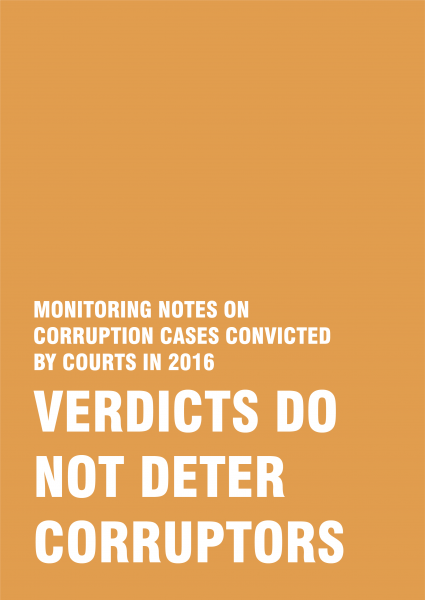Trends of Corruption Verdicts 2016
Wed, 04/05/2017 - 00:00

MONITORING NOTES ON CORRUPTION CASES CONVICTED BY COURTS IN 2016
VERDICTS DO NOT DETER CORRUPTORS
Eradication of corruption should be done in a variety of efforts, including both prevention and enforcement. Community organizing, advocacy of issues, and dissemination of anti-corruption policy are inseparable from these efforts, including in law enforcement. The judiciary is one of the spearheads of eradication of corruption, particularly in deterring corruptors.
Since its inception in 2012, until 2016, ICW has regularly monitored and collected data on verdicts of corruption cases in the Corruption Court (and previously also the General Court), the High Court, to the Supreme Court, either through cassation or reconsideration (PK). Through this monitoring effort, ICW can identify which institution committed the highest amount of corruption, the harshest court verdict for corruption, the average length of sentence for corruption, and potential losses of the state from the corruption cases monitored. The monitoring results are also essential in giving recommendations to the Supreme Court and the Judicial Commission to make improvements and to implement the function of performance monitoring.
In 2016, ICW has conducted monitoring of 573 corruption verdicts, of which 420 verdicts were made at the courts of first instance, 121 verdicts at the courts of appeal, and 32 at the Supreme Court. From the 573 corruption cases monitored, the amount of state loss was Rp 3,085,491,163,365. The amount of bribes was Rp 2,605,000,000 and USD 212,000 and SGD 128,700. The amount of fine was Rp 60,665,000,000, and the amount of compensation money or uang pengganti was Rp 720,269,569,276.
ICW categorizes the sentences for corruption into three groups: lenient (less than 1 to 4 years imprisonment), moderate (4-10 years imprisonment) and harsh (over 10 years imprisonment). The lenient category is based on the consideration that the minimal prison sentence in Article 3 of the Anti-Corruption Law is 4 years imprisonment. It means that any sentence less than 4 years is a lenient one. A moderate sentence is between 4-10 years, while a harsh sentence entails more than 10 years imprisonment.
ICW finds that the average sentence in 2016 varies between levels. At the court of first instance, the average sentence is 1 year and 11 months. At the appellate court, the average sentence is 2 years and 6 months, and at the cassation level 4 years and 1 month. There is a tendency of increasing sentence at the appeal and cassation levels. However, overall across the three levels of courts, the average sentence for corruptors in 2016 is still quite lenient, 2 years and 2 months in prison.
Read full document below.










